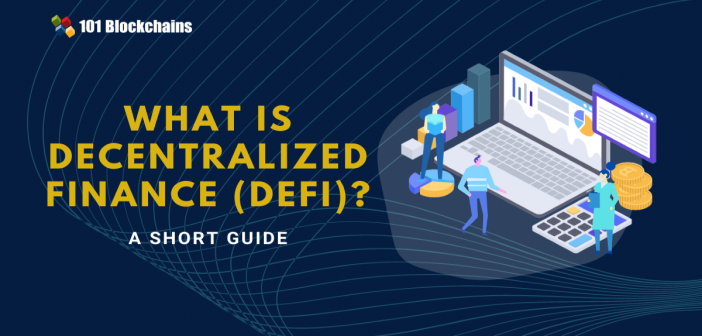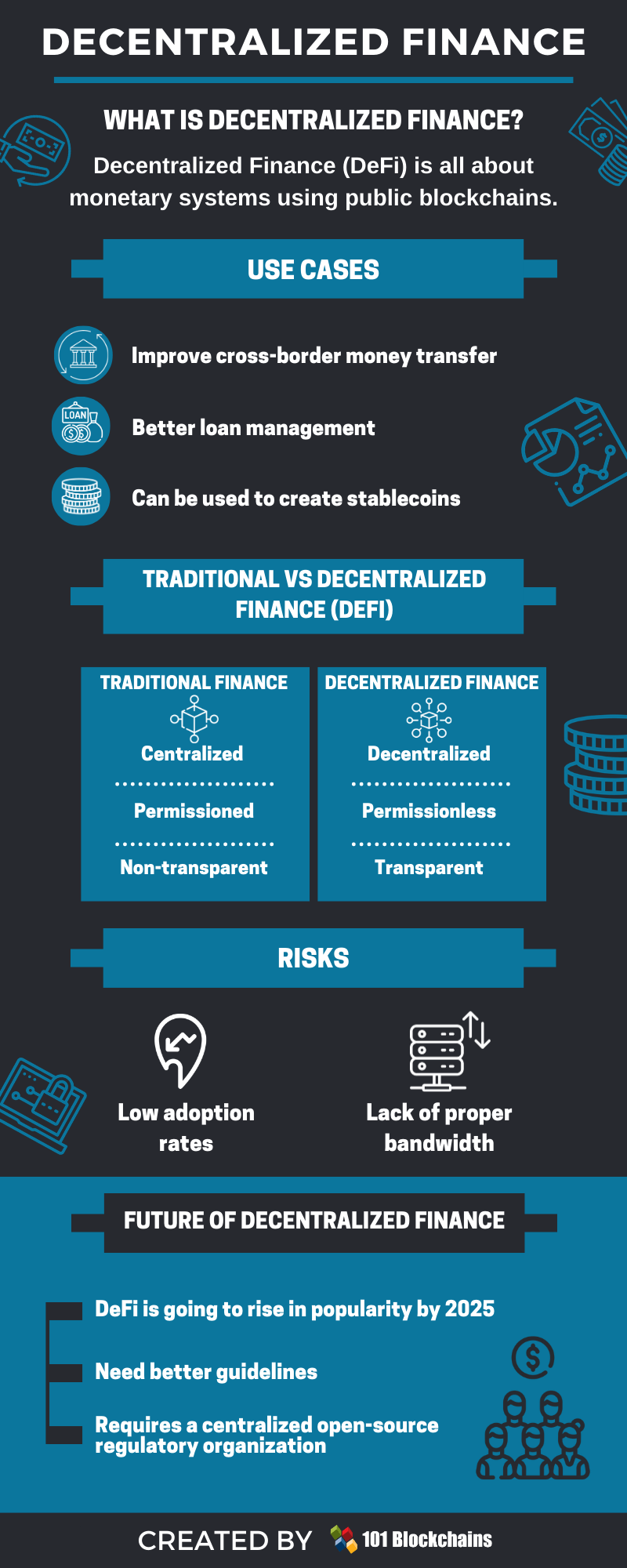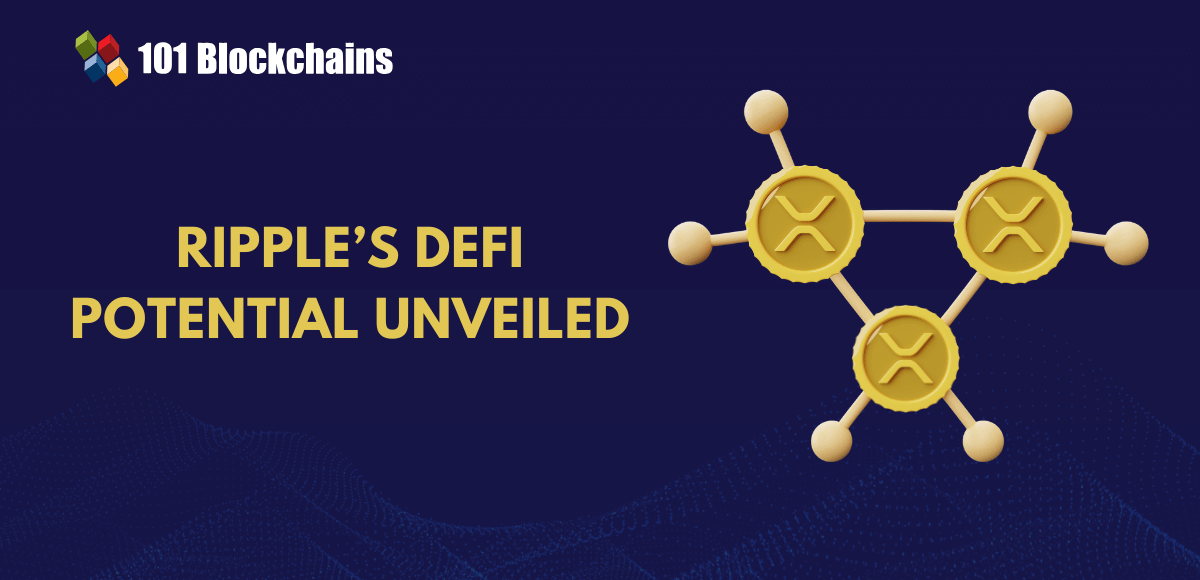Learn how blockchain truly works, master key definitions, and uncover what makes smart contracts so "smart." Dive into the fundamentals, gain valuable insights, and start your blockchain journey today!

- Decentralized Finance
Diego Geroni
- on January 02, 2021
What is Decentralized Finance (DeFi)? A Short Guide
The world of crypto has always been speculative. However, the technological aspect is what makes crypto so accessible. Blockchain is one of the latest technologies that are changing how different sectors work.
Finance is no different. In this article, we are going to discuss decentralized finance and how it is going to change how financial firms work. Crypto is driving financial institutions to take steps for the future. They are now looking at blockchain and crypto as their next technology for solving critical problems within the finance sector.
Want to know more about DeFi? Enroll Now: Introduction to DeFi Course
What is Decentralized Finance?
Decentralized Finance (DeFi) is all about monetary systems using public blockchains. It is a new monetary system and hence is one of the hot topics among the industrialists, blockchain experts, and learners like you!
At the core, the term “public” is important here. It can be equated to similar to that of Ethereum public blockchain. In the public blockchain, there is no place for centralized authority.
The need for DeFi comes from the fact that financial services are not available to everyone around the world. Almost 1.7 billion people all around the world have no means and access to financial services. The financial institutes can also not provide the necessary infrastructure to make people more access to money. The existing infrastructure is huge, but it does lack when it comes to reaching everyone out there.
With decentralization, the current infrastructure failures are solved. It removes the failure point and ensures that the records can be stored and shared among different nodes across the network. It can work on a peer-to-peer network without any centralized authority.
For the current infrastructure to work, there is an over-dependence on the centralized authority. Without its governance, rules, regulations, and reach, it is impossible to implement in some areas, especially in places where wealth generation and distribution are less or inadequate.
Also, centralized authority holds the power to delete accounts or block them if they deem so. Censorship might be needed in some cases, but in most cases, it is restrictive and makes the users suffer.
Another key element of the DeFi is the decentralized apps(dApps). DApps enable the financial institutes to create functional apps on the public blockchain and ensure that anyone can interact with them with minimal cost per interaction.
Want to explore in-depth about DeFi protocol and its use cases? Enroll in Decentralized Finance (Defi) Course- Intermediate Level Now!
Decentralized Finance Approach
Now that we have an answer to “What is Decentralized Finance,” it is now time to know how Decentralized Finance DeFi can be applied. From the start, DeFi seems to be promising. It can change many lives and help employ an infrastructure that doesn’t require a centralized approach.
Please include attribution to 101blockchains.com with this graphic. <a href='https://101blockchains.com/blockchain-infographics/'> <img src='https://101blockchains.com/wp-content/uploads/2020/01/decentralized-finance.png' alt='decentralized finance='0' /> </a>
-
Remittance Market Solution
The most significant impact of DeFi would be on the remittance market. The market surrounds the idea of sending millions of dollars across the borders by workers that are working in foreign countries.
They go through a lot of problems with sending the money. One of their biggest problems is the amount of fee that they have to pay to complete the fees. If the employee is earning less, then he would have very little to send.
On top of that, the fee cut makes it even harder for anyone working in extreme conditions to save anything and send.
With Decentralized Finance DeFi, it will be possible to cut the cost associated with sending money by 50% and more. By using DeFi, anyone working overseas will not have to worry about sending payments across borders. Ethereum-based decentralized finance applications are more popular here.
Build your identity as a certified blockchain expert with 101 Blockchains’ Blockchain Certifications designed to provide enhanced career prospects.
-
Loans
Decentralized finance is also very helpful when it comes to loan management. In general, the loan industry is very dependent on having access to banking.
If you do not have access to banking or similar service, you cannot take a loan. This means that you also need to have a proper credit score or a banking record that you can show to prove your eligibility for the loan.
With DeFi, all of these are going to change. The platform can address the connectivity issues among lenders and borrowers. They will connect them better and directly. Also, it will ensure better credit checks and ensure that digital assets can be transferred quickly.
There are many Ethereum-based decentralized finance applications that offer loan facilities.
-
Stablecoins
Another extremely good use case of DeFi is its use in stablecoins. Stablecoins are created in such a way that its value doesn’t change. Decentralized finance coins are mostly stablecoins and they are a crucial part of this technology.
They are digital currencies that can be used by the general population as a digital currency. It can be used as a currency released by the government.
In fact, it makes tokenizing real-world assets easy. Real-world assets can be added to the blockchain and hence traded on the blockchain. Storing assets on the blockchain means better security and less prone to cybersecurity. We recommend checking out these decentralized finance coins yourself to experience how these work in the first place.
Want to learn the basic and advanced concepts of stablecoins? Enroll Now: Stablecoin Fundamentals Masterclass
Traditional vs. Decentralized Finance (DeFi)
What makes traditional and decentralized finance (DeFi) different? The main difference is how they work.
Traditional financial systems work with centralization, and it brings inefficiency and insecurity. The security risks are persistent in the current traditional financial system. Cybercrime is also seeing an increase due to no evolution of the technologies used by finance institutes. Most of the transactions are at risk of getting hacked. All of these bring in both financial and data risks.
DeFi, on the other hand, ensures that the issues are fixed to a certain extent. At the core, DeFi uses a public blockchain, which means that it doesn’t rely on a centralized system or entity. It can work without the need for proper infrastructure.
It simply decentralizes the world’s economy and brings economic activity viable to everyone around the world. Public blockchains can effectively replace the traditional financial system and make them transparent, decentralized, and permissionless.
Let’s discuss the improvements it brings below.
- Permissionless: Public blockchain doesn’t require anyone else permission to join and interact. This makes them a great pick for global implementation. It also ensures that the inequality problem is fixed.
- Decentralization: With no central authority, the data is stored among the different nodes in a network
- Transparency: Public blockchain is also transparent.
Decentralized Finance example includes Rainier AG. It is an independent asset management firm which is using the crypto field to their advantage. They have established a proper STO exchange platform along with a trading platform for cryptocurrencies.
They are currently working to improve their ecosystem by offering unique services in the finance sector. Anyhow, if you want, you can use this guide as a decentralized finance pdf for your blockchain project learning material.
Decentralized Finance Risks
Not everything is positive when it comes to decentralized finance. Some challenges need to be covered to make it more viable for the different governments and organizations out there.
One of the biggest challenges that DeFi has to encounter is the adoption rates. Even though we are connected through the Internet, we rarely have public awareness regarding the DeFi.
Not many people know about DeFi, and that can impact its use rate. In fact, there are very few people who know about crypto. Crypto gained its popularity during the bitcoin price rise, and still, it is nowhere near the “internet” or other more popular technologies out there.
Even though public blockchains are technically capable of accepting every one of us out there, they lack the bandwidth to work efficiently. In comparison, Visa can process a huge number of transactions per second.
This limitation is what not making bitcoin such a big success. In fact, other second-generation blockchain solutions, including Ethereum, lack the bandwidth to make it more real-world appealing. Right now, blockchain researchers are working hard to make the technology more scalable.
Another biggest concern for DeFi is its connection with cryptocurrencies. Blockchain is an ideal network to transfer digital assets.
Stable coins are the answer but cannot be used for every transaction out there. This is where cryptocurrencies come in. But cryptocurrency’s volatility nature is what makes it not an ideal solution for the real world.
Libra, a stablecoin released recently, has gone through both positive and negative reception. Overall, it didn’t receive a positive reception, and many institutions have backed out of collaborating on the Libra project.
Want to become a bitcoin expert? Enroll Now in Getting Started with Bitcoin Technology Course
Why Is Decentralized Finance Is So Popular?
You must be wondering why decentralized finance or DeFi is so popular among financial institutions. Well, as you can see it does come with a lot of benefits. For example, it will offer you more security and transparency in the long run.
Apart from the adoption works, DeFi also needs to make sure that it has a proper regulatory framework. As it is on a public blockchain, it is necessary to bring regulations to space.
Right now, there are multiple DeFi organizations that are working on their own solutions. Their solutions are independent and hence do not follow any guidelines.
It creates a fragmented market, which would become hard to make one in the near future. With more and more DeFi platforms, we can find none of them succeed, wasting time, money, and risking the idea as well.
There are also some countries that are banning cryptos or regulating them too hard to make them hard to use.
The solution is to have an open-source regulatory organization that can work together to bring projects together. By doing so, we can ensure that the DeFi can grow in the right direction.
-
Rise to Popularity
Blockchain is more than a decade old. However, we didn’t see the DeFi popularity until 2019. This is because most of the world is not connected through the Internet.
At that time, decentralized finance didn’t make any sense as it would require the Internet for connectivity.
I think that DeFi will become more mainstream by 2025. The Internet is growing rapidly and is becoming more affordable than ever. India, one of the third-world countries, has also seen tremendous growth when it comes to mobiles and internet connectivity.
Anyhow, if you want, you can use this guide as a decentralized finance pdf for your blockchain project learning material.
Catch up on the latest trends in decentralized finance (DeFi) and its connection to crypto with DeFi Skill Path
Conclusion: Future of Decentralized Finance
At present, the future of decentralized finance seems quite bright. Many companies are already looking into decentralized finance as an alternative to traditional ones. Also, many companies have already taken the necessary steps to implement decentralized finance projects.
So, it seems the adoption will keep on rising. Thus, if you are in a financial institute or in a similar company that deals with finance, you should definitely take a look at DeFi. As it’s a rising star now, you shouldn’t miss out on the chance to benefit from it.
For any novices out there, who want to get in-depth to the topic, even more, we recommend starting with our Introduction to DeFi Course. Why not start the adoption process now?
*Disclaimer: The article should not be taken as, and is not intended to provide any investment advice. Claims made in this article do not constitute investment advice and should not be taken as such. 101 Blockchains shall not be responsible for any loss sustained by any person who relies on this article. Do your own research!





![30+ Best Decentralized Finance Applications [Updated] best decentralized finance (DeFi) applications](https://101blockchains.com/wp-content/uploads/2020/10/decentralized-finance-applications.png)

